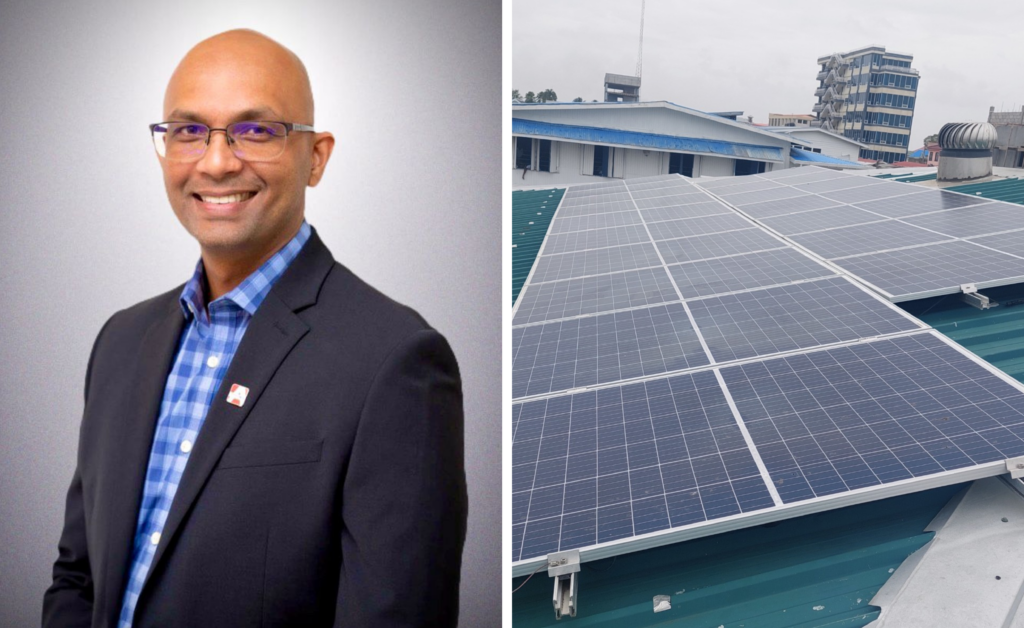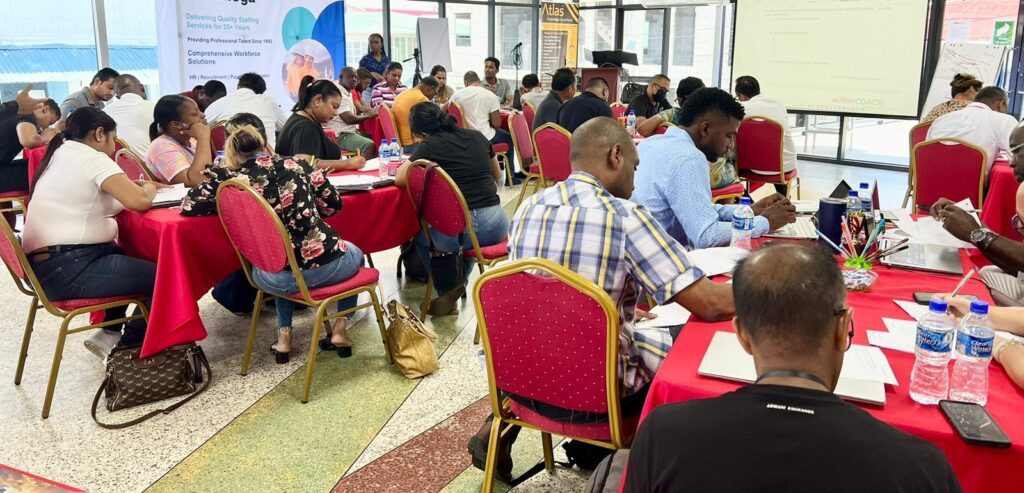– ActionINVEST Caribbean Inc. highlights its sustainability efforts alongside Guyana’s push for wider energy access, low-carbon economy
(Georgetown) May 28, 2024 – Guyana’s development of renewable energy is crucial to achieving its low carbon development goals. The Government of Guyana has implemented several measures to facilitate investments and support the shift towards renewables. As a result, an increasing number of companies are making the switch from fossil fuels to renewable sources of energy to power their daily operations. ActionINVEST Caribbean Incorporated (ACI), in the private sector, is one such company that has embraced more sustainable practices, by retrofitting its building with a solar photovoltaic (PV) system and transitioning to electric vehicle (EV) use.
According to the Founder and Executive Chairman of ActionINVEST Caribbean (ACI) Incorporated/ActionCOACH Guyana, Dr. Vishnu Doerga, the company’s motivation to prioritize sustainability stemmed from the need to reduce its energy consumption, save money on electricity bills, and foster a more environmentally conscious culture among the staff. ACI leverages solar energy to power both its business and charge its electric vehicle (EV). Already, the company has achieved payback on the solar photovoltaic (PV) system in less than three years, using the savings from its electricity bills.
“ACI is an ISO 9001 certified education company established in 2014, that has expanded its services to encompass business development, coaching, and consulting programmes,” said Dr. Doerga, before adding: “ACI did a load analysis, in 2019, to determine the type of system needed for our services. At this time, the Guyana Power and Light (GPL) was implementing the net-billing system as well.” He disclosed that a 10-kilowatt grid-connected solar photovoltaic (PV) system was set up at the facility the same year at a cost of GY$4.4M. A team of engineers from the Guyana Energy Agency (GEA) conducted the load profiling of the building to ensure optimal sizing and performance of the solar photovoltaic (PV) system.
Today, this renewable energy investment benefits approximately thirty (30) persons at the company. ACI uses nearly 75 percent of its energy consumption for cooling through high-efficiency inverter air conditioning units (Acs). Meanwhile, lighting utilizes an additional 10-15 percent, and the remaining power is used by appliances such as computers, printers, and projectors.
ACI can also track the energy received from the grid, energy supplied to the grid and net energy consumed by the load of the building. “Our office consumes the power almost exactly as we produce it. We are almost net zero every day, and on the weekends, we produce excess power to charge our EV,” he noted.
Moreover, it was a renewable energy forum with the Head of the Guyana Energy Agency (GEA), Dr. Mahender Sharma that prompted Dr. Doerga to purchase an MG4 electric vehicle (EV) for ACI. The company began operating its EV with a 51-kilowatt-hour battery, and a 350-kilometer range in January 2024. Previously, the company’s gasoline-powered vehicles cost nearly GY$1M annually to operate. In contrast, the capital cost of the electric vehicle is GY$6M. By eliminating fuel and maintenance expenses, ACI expects to see a return on investment on the EV in about six years.
“We are one of the few companies in Guyana to invest in this type of set up, both the solar PV system and electric vehicle combination, and the team is proud to be one of the first to make it a success. By using renewable and alternative energy we are helping, in a small way, to reduce carbon emissions,” he said. Further, Dr. Doerga emphasized that the Government of Guyana’s interventions to encourage renewable energy adoption for companies like ACI, has helped to foster a seamless investment and transition process.
Renewable energy technology is eligible for customs duty and value-added tax (VAT) exemptions, and there is a one-off tax holiday of two years for corporation tax to importers of items for solar and wind energy investments. Additionally, the grid-connected solar photovoltaic (PV) net-billing system has enabled the renewable energy transition and cost savings at ACI. The company’s solar panels generate a portion of the energy required by the load of the building. On a normal business day, the grid-connected inverter monitors the amount of energy from the solar panels, measures the amount of energy being consumed by the building, then takes the difference from the grid. He stated that the company consumes most of the energy it produces, however, the system is set up so that when the load of the building is less than the energy supplied from the solar panels, GPL could credit the company for the excess energy that is supplied to the grid.
With regards to electric mobility, there are currently six publicly accessible EV charging stations, and regardless of the power rating, electric vehicles attract zero rates of duty and taxes. There is also an increase in the write-down allowance applicable to all electric vehicles to 50 percent annually, to support businesses such as ACI that decided to invest in eco-friendly cars.
A Low-Carbon Economy
Dr. Doerga encouraged companies, especially in the private sector, to take the step and transition to renewable energy use. He also urged them to carefully consider their energy needs, sustainability goals, as well as examine their financing options before investing in renewable energy to power their own operations. Presently, he has plans to add more solar panels to ACI’s second location and increase the electric vehicle (EV) fleet. In addition to this, Dr. Doerga stated that the national-level conversations are important to engage the public in promoting renewable energy. He applauded the Government of Guyana for its work and commitment toward ensuring reliable, affordable, and stable energy access for all Guyanese.
“I believe that the provision of information by the Guyana Energy Agency is instrumental in helping private sector businesses learn more about sustainable energy. This approach is key to sensitizing people about the country’s ongoing renewable energy development and energy sector transformation,” said Dr. Doerga.





